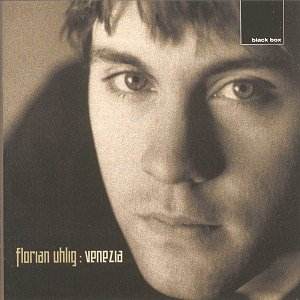|
With the regulation aggressive scowl from the performer
on the front cover and a programme which contains 4 premières amongst
some very well-known pieces, this looks like a challenge to the classical
product as we know it. Maybe on the marketing level it is just that, but
I hope it will reach more traditionally-minded listeners too, for it enshrines
the work of a pianist (and composer) remarkable for his ability to create
soft, evocative poetic atmospheres. An ominous note from Uhlig upholds
the artist's right to modify the composer's intentions but in fact his
Chopin Barcarolle is notably more straight than most. Already in the programme,
in the Abert, he had demonstrated an ability which is rare today; that
of separating the various voices in the texture so that melodies sing
out and accompanying figures take their rightful place in the background.
He begins the Chopin with a touch of liquid beauty and, where Rubinstein
and Lipatti often forge ahead, he remains true to this opening mood even
as the music surges towards its climax. These latter pianists do, in their
very different ways, provide special insights into the last page-and-a-half
where Uhlig is a little prosaic in his literalness; elsewhere their superiority
is less certain, and this is high praise. What Uhlig does allow, which
the other two don't, is a degree of pedal-haze. Pianists of the old school
were insistent that the consecutive notes in the accompanying figure should
never be blurred by pedal. On the other hand, modern ears are no longer
disturbed by the resulting dissonance and there is a gain in atmosphere,
especially since Uhlig's touch is sufficiently delicate as to avoid confusion.
This CD derives from Uhlig's desire to place the Barcarolle
in a specifically Venetian context, rather than an all-Chopin or a string-of-popular-pieces
context. It should be pointed out that barcarolles are not automatically
gondola-songs, since other countries and cities have their odd patch of
water here and there, but if we grant a Venetian inspiration to the Chopin
the idea certainly produces a fascinating programme. Uhlig's poetic manner
is well-suited to Liszt, the Mendelssohn is suitably warm-hearted (though
why does he bring out the middle C in the left-hand of bar 2 as if it
belonged to the melody-line?) and in the Fauré he knows that French
music shouldn't dawdle too much - he keeps it refreshingly on the move.
As a composer he is, on this showing, as evocatively atmospheric as his
pianism might lead one to expect. His other contribution, the Marcello
arrangement, will raise some eyebrows. Most people will know this melody
as pertly tarted-up by Stravinsky in Pulcinella. Here it is made into
a pretty salon piece. Naughty but nice.
With the Malipiero he does miss the mark, by trying
to find a post-Debussyan refinement in these abrasively sardonic utterances.
A Venetian birth-certificate does not guarantee suitability for a programme
of this kind (I thought the same about the pleasantly-handled Galuppi
Sonata). Malipiero was a true son of Venice, but the Venice which inspired
him was that of the exasperatedly mannered Commedia dell'Arte.
This is unlovable music, but taking the nasty edge off it doesn't make
it nice.
The recital ends as it begins, with a set of variations
on The Carnival of Venice. One criticism to be levelled at Uhlig is that,
having written in his introduction at length about Chopin and Liszt, he
offers no comment on the rarer works. In the case of Gibsone we do not
even get the dates, which suggests that no information could be found.
Nor have I any to offer, except that an undistinguished piece for organ
was published by Novello around 1900 in an album by otherwise British
composers, leading one to suppose that he was, despite his odd name, British
either by birth or adoption.
In this album Uhlig shows himself to be a creative musician
on several levels - performer, composer and (not least) programme-builder.
I wish this warmly-recorded disc every success.
Christopher Howell.
See
also:
CD Review by Peter
Grahame Woolf
Concert Review by Peter
Grahame Woolf and by Theo
Wohlfart
|

